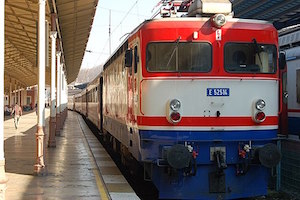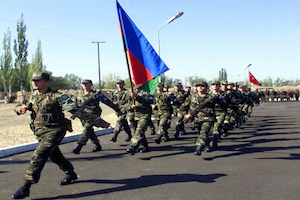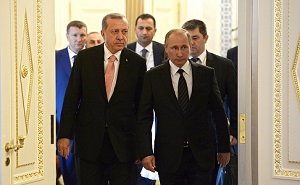Will the Lapis Lazuli Railway Corridor Finally End Afghanistan's Isolation?
By John C. K. Daly
December 1, 2017, the CACI Analyst
On November 15 during the 7th Regional Economic Cooperation Conference on Afghanistan (RECCA-VII) in Ashgabat Turkey, Afghanistan, Turkmenistan, Azerbaijan and Georgia signed an agreement providing for a major international trade and transport corridor stretching from Turkey to Afghanistan via the post-Soviet Central Asian republics, named the “Lapis Lazuli Corridor.” While many practical problems remain, the development and operation of such a railway corridor has enormous implications for the countries along its route, particularly Afghanistan.

Revitalizing the Military Dimension of the Azerbaijan-Georgia-Turkey Tripartite Partnership
By Ilgar Gurbanov
July 24, 2017, the CACI Analyst
On May 23, the defense ministers of Azerbaijan, Georgia and Turkey (AGT) held a trilateral meeting in Batumi, followed in June by the joint trilateral field training Caucasian Eagle 2017 of the three countries’ Special Operations Subdivisions in Georgia’s Vaziani base. The negative impact of terrorism and aggressive separatism on stability and development in the region makes it necessary to pool the capabilities of these countries to confront potential threats directed against their security and sovereignty. The AGT tripartite partnership has proven more successful than other regional integration blocs and initiatives.

Weaker Turkey leaves the South Caucasus without Strategic Anchor
By Mamuka Tsereteli
February 17, 2017, the CACI Analyst
The weakening strategic position of Turkey will have a profound impact on the Black Sea-Caspian region and wider Central Asia. An assertive Russia and diminishing U.S. and Western engagement further limits Turkey's ability to play a pro-active role in the region. For regional actors in the South Caucasus, part of the solution should be to create the best possible conditions for transiting Asian cargos via Central Asia, the Caspian Sea, the South Caucasus corridor and the Black Sea to Bulgaria and Romania. This is how countries of the South Caucasus can bring new balancing powers to the region.

EU–China trade to bolster security in the South Caucasus
By Boris Ajeganov
January 23, 2017, the CACI Analyst
Foreign investment in Georgia is strengthening the country’s importance in connecting East Asia with Europe, which has positive implications for the broader region. The rise in FDI in commercial and transportation infrastructure in combination with the signing of international free trade agreements will reduce Georgia’s vulnerability in terms of economic and, ultimately, ‘hard’ security. The growing importance of the South Caucasus as node for EU-China trade will weaken Russia’s incentives to undermine its southern neighbors by military, political, and economic means as it has done in the past. Accordingly, Tbilisi’s ability to conduct an independent foreign policy is set to improve despite the absence of Western security guarantees.
Advancing Georgian-U.S. security cooperation after the Trump transition
By Richard Weitz
January 19th 2017, the CACI Analyst
The Trump administration will soon undertake a comprehensive review of Russia-US relations and U.S. policy toward the rest of Eurasia. Although the new team will presumably consider many options, the president-elect’s statements imply that the U.S. will not soon support further NATO expansion or other actions that would strongly antagonize Moscow. Despite this limitation, the U.S. government will continue security ties with U.S. partners in Eurasia, such as Georgia. In practice, there are a number of steps the U.S. and Georgia can undertake to advance their mutual security.





